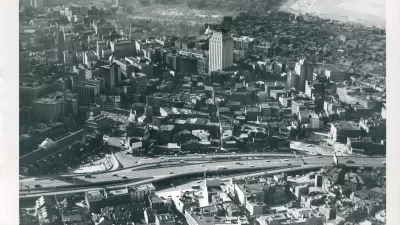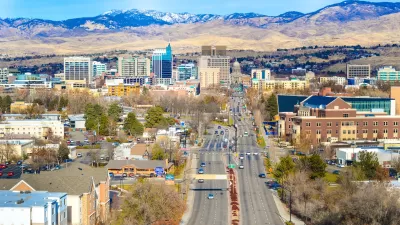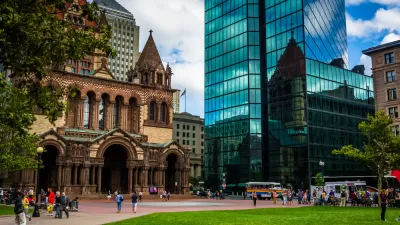Michelle Wu, Boston's new mayor, is ready to finally end the government powers that displaced communities in the mid-20th century.

In February, Boston Mayor Michelle Wu asked the City Council to end five of the city’s 14 active urban renewal plan areas, "with the goal of winding down all of the plans by the end of this year," reports Catherine Carlock for the Boston Globe.
"A powerful urban development tool granted to the then-Boston Redevelopment Authority in the late 1950s, urban renewal has been the city’s primary mechanism to take so-called 'blighted' property by eminent domain, and was key to the wholesale razing of the West End, Scollay Square, and parts of the South End and Roxbury in the 1950s and ′60s," explains Carlock.
Mayor Wu wrote a letter to the City Council explaining the rationale behind the request to end the city's urban renewal districts—connecting the contemporary urban renewal districts to their history as tools of displacement through "slum clearance" and other methods of a previous era of planning. "My administration is committed to putting equity at the forefront of planning and development decisions and the sunsetting of urban renewal in Boston should be viewed through this lens," wrote Wu in the letter.
As noted by Carlock, Wu campaigned on the issue of sunsetting the city's urban renewal districts, along with other larger structural reforms for the Boston Planning and Development Agency, so stay tuned for more reform developments.
FULL STORY: Wu says she’ll wind down Boston’s urban renewal districts. Here’s what that means.

Alabama: Trump Terminates Settlements for Black Communities Harmed By Raw Sewage
Trump deemed the landmark civil rights agreement “illegal DEI and environmental justice policy.”

Planetizen Federal Action Tracker
A weekly monitor of how Trump’s orders and actions are impacting planners and planning in America.

Why Should We Subsidize Public Transportation?
Many public transit agencies face financial stress due to rising costs, declining fare revenue, and declining subsidies. Transit advocates must provide a strong business case for increasing public transit funding.

Understanding Road Diets
An explainer from Momentum highlights the advantages of reducing vehicle lanes in favor of more bike, transit, and pedestrian infrastructure.

New California Law Regulates Warehouse Pollution
A new law tightens building and emissions regulations for large distribution warehouses to mitigate air pollution and traffic in surrounding communities.

Phoenix Announces Opening Date for Light Rail Extension
The South Central extension will connect South Phoenix to downtown and other major hubs starting on June 7.
Urban Design for Planners 1: Software Tools
This six-course series explores essential urban design concepts using open source software and equips planners with the tools they need to participate fully in the urban design process.
Planning for Universal Design
Learn the tools for implementing Universal Design in planning regulations.
Caltrans
Smith Gee Studio
Institute for Housing and Urban Development Studies (IHS)
City of Grandview
Harvard GSD Executive Education
Toledo-Lucas County Plan Commissions
Salt Lake City
NYU Wagner Graduate School of Public Service





























